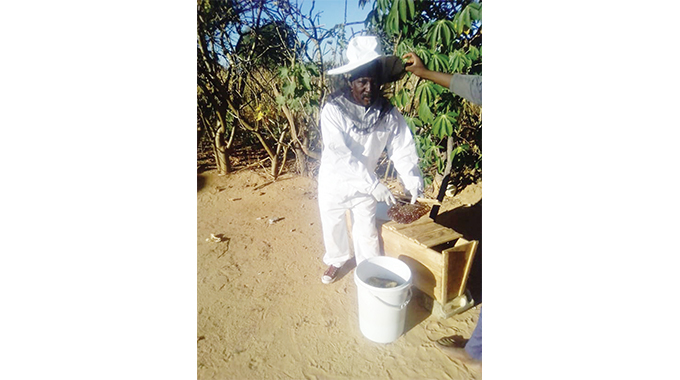
Sukulwenkosi Dube-Matutu, Gwanda Correspondent
WHEN he was retrenched from his job in the manufacturing sector in 1993 Mr Feli Khumalo (65) from Izimnyama area in Mangwe District decided to fully venture into farming to eke a living.
Ten years later he decided to practice beekeeping which later became one of his main sources income. Mr Khumalo has gained vast knowledge and experience in beekeeping and has trained a number of farmers in the field.
He has become a renowned supplier of honey within his community and surrounding districts.
“When I learnt about beekeeping I realised that I had vast amount of land at my homestead and appropriate vegetation to start the project.
I started beekeeping in 2003 and I have been getting good income from selling honey. I have 17 bee hives that I placed in my homestead and I recently harvested honey from all the boxes.
“Each box gives me 15 litres of processed honey and after selling I get about R4 000 from each bucket and for all 17 buckets I get about R68 000. I package my honey into 375ml containers and sell each for R100. This is really good money considering that I don’t incur much costs when processing the honey. I can harvest the honey twice a year but other farmers can harvest three times a year depending on the number of boxes they have. I have a wide clientele and my customers now know when to expect the honey,” said Mr Khumalo.
He said beekeeping farming was not complex but it required dedication and commitment. Mr Khumalo said safety was also important in beekeeping to avoid being stung. He said since he started beekeeping he had never recorded any incident of the bees attacking him, his family, neighbours or livestock.
Mr Khumalo said if not done properly one can fail to harvest any honey for consecutive years and eventually abandon the project.
“The boxes shouldn’t be placed on the ground but they must have stands. After placing the boxes there is need to monitor them in the morning and evening to ensure that pests such as ants, lizards, termites and snakes don’t creep into the box. Once the pests invade the box then bees won’t colonise it.
“It’s also important to know at what point to harvest the bees. If they are still busy moving in and out of the box they must not be disturbed.
If they are now settled in the box and are no longer moving then it’s indication that there is honey. In the evening when they have settled, I usually lift the box to check its weight. I also know by now that four months after placing my boxes the honey will be ready for harvest,” he said.
Mr Khumalo said he produces good quality honey and this has seen him have a wide clientele. He said he was also practising livestock and agriculture farming.
Forestry Commission provincial manager for Matabeleland South, Mr Bekezela Tshuma said the concept of beekeeping as a source of livelihood was slowly spreading across the province.
He said six of the seven districts in the province now had beekeeping farmers except for Beitbridge as the vegetation there was not ideal.
Mr Tshuma said they had trained beekeeping farmers in various districts with the assistance of different partners.
“Beekeeping farming can be a reliable source of income and farmers in the province are slowly realising this. There is a good and readily available market for honey. Beekeeping is actually a cheap farming method because it does not require inputs, stock feed or many chemicals. It just requires bee hives and then the bees come in and do their work. However, monitoring of the hives is crucial and farmers have to grasp the technique which is applied in beekeeping.
“We have farmers in various districts who are practising beekeeping. Some are operating at individual level just like Mr Khumalo while others work as groups. Our farmers are really improving in terms of the quality of honey they produce and the quantities,” he said.
Mr Tshuma said some farmers have remained reluctant to practice beekeeping out of fear of being stung. He said some farmers could not afford to buy protective clothing hence the need for partners who could equip the farmers. Farmers, Mr Tshuma said, were encouraged to practice beekeeping in an environmentally friendly manner. Mr Tshuma said farmers should not harvest honey in June as bees will not be having any forage. He urged farmers to plant trees near their hives to ensure that bees had a source of food close by and to set their hives near water sources. — @DubeMatutu.
